How to create a more accessible campsite, caravan park or glampsite
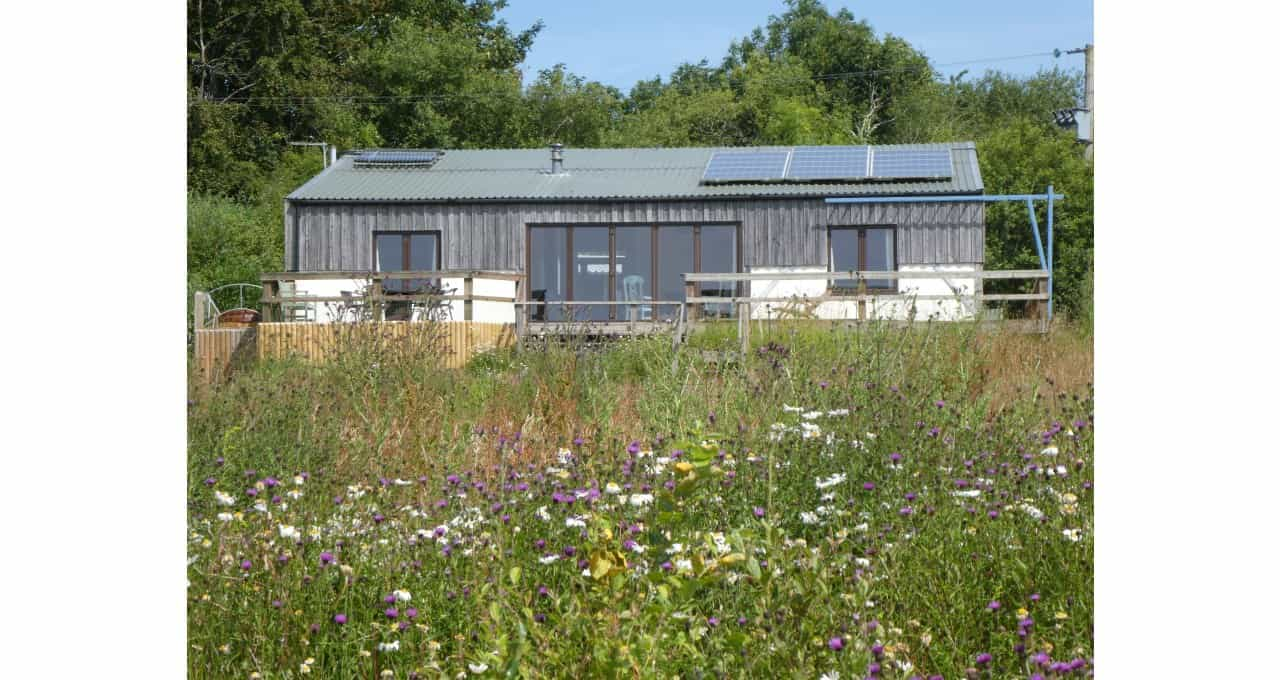
At Pitchup we believe the outdoors is for everyone, so we’re committed to making it easier for disabled campers and campers with accessibility requirements to find a site that meets their needs.
We’re often asked what sites can do to improve accessibility, so below you’ll find some practical hints and tips to help you welcome all guests.
Jump to:
What is accessibility?
Accessibility is about removing barriers to allow positive and equal experiences for everyone. Barriers can be physical, digital and attitudinal.
For example, providing large-print information for your site is a great way to remove barriers for people who are blind or partially sighted. Likewise, providing staff training and equipping teams with helpful resources can remove attitudinal barriers and improve understanding of disabilities. This improves the guest experience of those with a disability or access requirements.
Additionally, marking an entrance as step-free, or having a lowered-height section of a reception desk removes physical barriers and gives a warm, accommodating welcome to wheelchair users.
Accessible Tourism is the delivery of tourism products, services and environments that allow people with impairments and accessibility requirements to have independence and choice.
[Source: Visit England, 2023, Accessible and Inclusive Tourism Toolkit for Businesses]
Accessible tourism: the big picture
Disabled travellers and travellers with access requirements are an important and growing segment of the tourism market. According to the World Health Organization, around 15% of the world’s population lives with some form of disability, with the United Nations World Tourism Organisation (UNWTO) estimating that around 70% of disabled people in the European Union (EU) are financially and physically able to travel.
The disability community is often underserved when it comes to accessible tourism, experiencing challenges in finding clear, detailed and accurate information on accessibility that empowers travellers to book.
Building accessible tourism products is first and foremost the right thing to do, but empowering disabled travellers with all the information they need, the choice to travel and the freedom to book can also give organisations a competitive and commercial advantage.
There are two key trends emerging in accessible tourism – multigenerational travel and adventure travel – and outdoor accommodation is perfectly poised to serve both these trends.
The Purple Pound
The phrase 'Purple Pound’ is often used to refer to the spending power of disabled households. It is estimated that:
-
$13 billion is spent globally per year on travel, including 17 million hotel visits and 9.4 million flights [Harris Interactive / Open Doors Organisation, 2020]
-
80 million disabled travellers are in the addressable market for accessible tourism
-
130 million when adjusted for senior citizens travelling with family or carers [UNWTO, 2020]
-
France and the UK have the highest proportion of people with accessibility needs relative to their population size. Along with Germany, these countries represent the three biggest source markets for accessible travel [The Centre for Promotion of Imports from Developing Countries (CBI), 2012)]
In the UK, the Purple Pound is also of significant importance to the tourism industry.
The 2018, Visit Britain and Visit England’s ‘Value of the Purple Pound’ report found:
-
£15.2 billion total spend generated by those with a disability or those travelling in a group where a member had a disability
-
£400 million inbound visitor spend by disabled travellers
-
£3.2 billion domestic overnight disabled traveller spend (2015)
-
£11.6 billion day trip spend
Disabled travellers and their companions represented:
-
1.9% of all inbound trips in 2018
-
15% of domestic overnight trips in 2015
-
20% of day visits
Disabled travellers are also likely to take longer trips on average:
-
One additional night for domestic stays, staying for 3.3 nights
-
Four additional nights on international trips, staying for 11.6 nights
Around 74% of disabled people choose holidays based on recommendations from others, family, friends and reviews [CBI, 2020], and are often loyal guests returning for multiple stays.
What are the most important things disabled travellers or those with access requirements consider when booking?
The five most important considerations for disabled travellers before booking holidays are:
1. Transport to and from the destination (53%)
2. Accessibility of booking services (53%)
3. Nature (48%)
4. Safety (48%)
5. Availability of information once at the destination (47%)
The five most important accessibility facilities in buildings such as hotels, museums and other public places like restaurants and campsites include:
1. Accessibility of the bathroom facilities
2. Accessibility of the parking facilities
3. Ease of use of lifts
4. Ease of use of furniture, furnishings and lights
5. Mobility within the building – i.e. how easy it is to move around the space freely
[Source: Entering the European Market for Accessible Tourism Products, CBI, 2022]
The small changes you can make for a big impact
Making accessible changes to your site doesn’t have to cost the earth, and small changes can have a huge impact for all customers, not just those with access needs.
Visit England’s Accessible and Inclusive Tourism Toolkit for Businesses is a fantastic resource for advice on how to improve accessibility.
Our favourites of Visit England’s top tips include:
1. A warm welcome to all
Offer to show all guests to their pitch or accommodation, and give a tour of the site facilities. Remember, not all disabilities are visible and offering a tour benefits all guests regardless of any access needs.
2. Welcome all assistance dogs
We love our four-legged friends here at Pitchup.com but assistance dogs are not pets, and thousands of people rely on them for independence and confidence. Under the Equality Act 2010, it is illegal to refuse access to a disabled person accompanied by an assistance dog even where you have a no pets/dogs policy, unless in exceptional circumstances (more information available in The Pink Book).
Welcome assistance dogs with water stations available, and if possible, let their owners know where they can exercise their dogs on site.
3. Train your team in disability awareness
Ensure your team is familiar and confident with ways to assist customers with disabilities and access requirements, as well as understanding facilities, services, equipment and evacuation procedures to give the best customer experience.
Visit Birmingham offers free online disability awareness training with multiple short modules.
You could also engage your local disability charity or community group to deliver this training to your team, sharing their lived experiences. Be sure to compensate any organisations fairly for their time.
4. Provide sufficient accessible parking spaces
Accessible parking spaces should be at least 2.4 metres wide with 1.2 metres hatching either side, on level ground, and marked out or clearly signposted.
Ideally these spaces should be pitchside, close to the entrance, or in the best possible location.
Ensure these spaces are not occupied by staff vehicles or vehicles that are not displaying a Blue Badge.
5. Provide clear signage on site
Have printed information and site maps available in larger font sizes. A minimum font size of 16 pts is recommended for people with a visual impairment
6. Provide a quiet space on site where children and adults can take a moment to decompress if they need it
A quiet space could have adjustable lighting and comfy seating, or be a peaceful nature spot ideally situated away from the hustle and bustle of your site, but easily accessible from public areas.
7. Provide seating or benches at regular intervals
If you have a large site where there may be a long walk between facilities, try to provide seating at 50-metre intervals.
8. Consider engaging a local access group
Invite your local access group on a site visit to give their advice and feedback on the accessibility of your site and give recommendations on changes or improvements that could be made.
Be sure to compensate the group for their time and expertise.
9. Colour contrast
Using contrasting colours on key surfaces can help to assist blind or partially sighted guests. For example:
-
Doors and doorframes of a different colour to the adjacent walls and floor
-
Door handles in a different colour to the door
-
Support rails and towels that contrast with the colour of the walls
-
A toilet seat that contrasts in colour to the toilet and floor
-
Different colours on step/kerb edges and the adjacent flooring
10. Provide accessible ways for disabled guests and guests with access needs to give feedback
Gathering and acting on feedback and the views of customers will help to provide accessible and inclusive experiences on site. This could mean adding a question on accessibility to customer surveys and reviews, or even just a quick chat when checking customers in/out.
The importance of good photography
To upload photos, head to the photo gallery tab of the Manager Portal.
Having eye-catching, relevant images can generate more views for your listing, which can ultimately lead to more bookings.
Photographs tell a story and can inspire travellers to dream not just of a destination, but of where they’ll sleep, what they’ll eat and the thing they will do while they’re there.
It helps guests to imagine themselves at your site, and have a good understanding of the features and facilities your site has to offer.
For the disability community, and for individuals with access requirements, having quality photographs of your site’s accessible facilities is essential for helping guests understand whether they can move around safely and comfortably.
Imagine you are a guest arriving at your site for the first time and add pictures for each step of the journey from arrival at the site entrance to:
-
Checking in at reception: capture pictures of ramps or step-free entrances, handrails and lighting
-
Accessible parking: capture a photo of the full parking space, showing the space available at either side
-
Pitch: capture pictures that show the terrain, and any entrance/exits or pathways
-
If the pitch type is a fixed accommodation like a lodge or pod, take pictures of the entrance, and clear interior photos that show the layout, bathroom, and any other key features like ramps and handrails.
Finally, be sure to include photos of accessible bathrooms and shower rooms. This will help your guests to have a really clear picture of what accessibility features they can expect to find and decide whether the facilities will meet their needs.
📸Top tip: When photographing entrances, such as a step-free entrance to a toilet block or lodge, consider using a tape measure in the photograph to show the width of the doorway.
This helps wheelchair users and those using mobility devices to know if their assistive equipment will fit through the entrance. You may need to add two photos: one showing the full width of the door, and a second that is a close up of the tape measure so guests can see the measurement.
📸Top tip: Consider adding photos taken from multiple angles so guests can see the full view of a step-free entrance (for example), and understand how spaces or routes connect.
This could include taking a photo of an entrance to an accessible toilet from both the inside and the outside, so a guest begins to picture the space and how they may move around.
The below images show the universally accessible camping pod at Cayton Village, Scarborough, from different angles, allowing guests to see the step-free entrances and layout of the space.
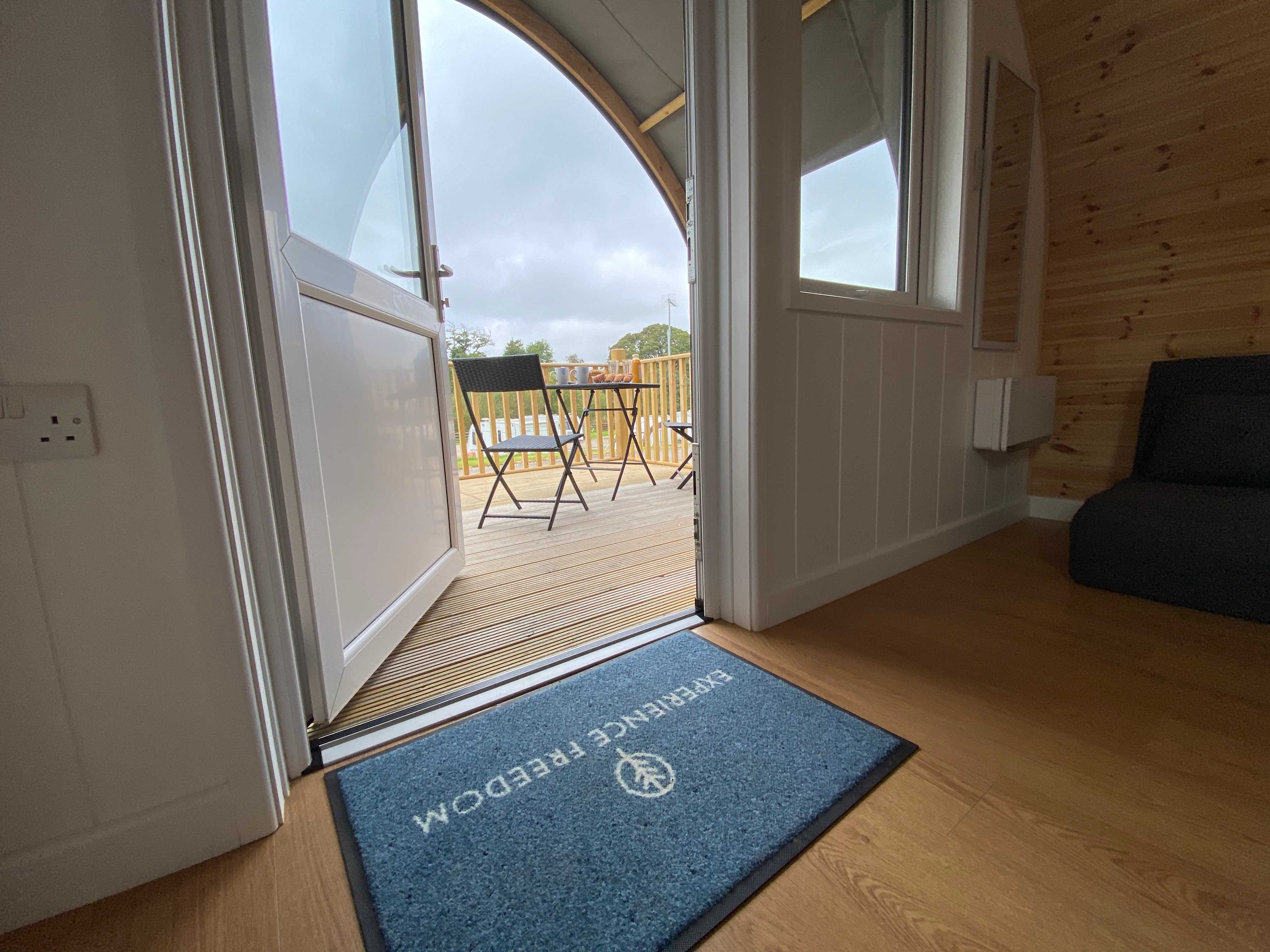 |
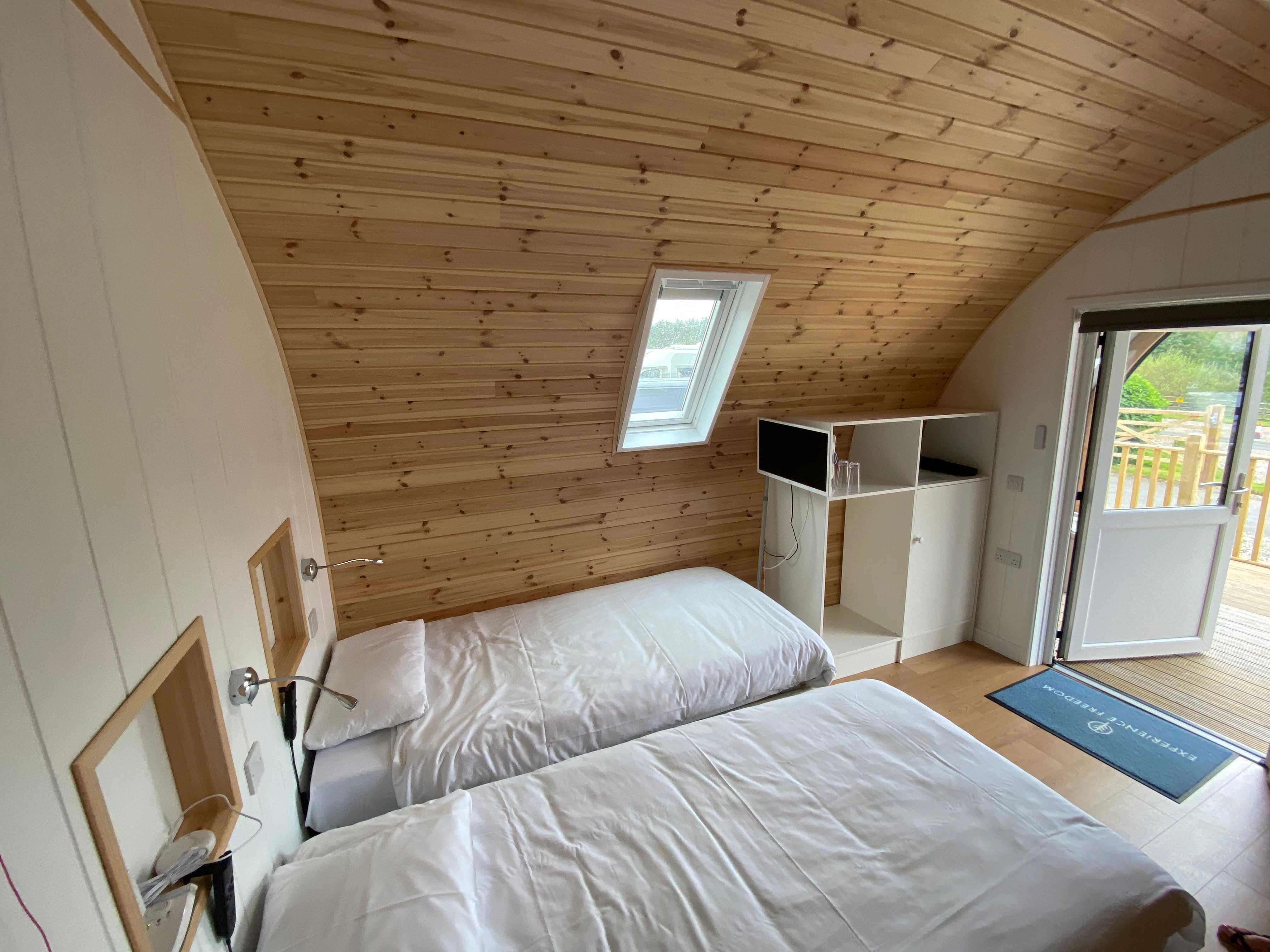 |
📸Top tip: If you have step-free showers on site or in your fixed accommodation (such as lodges or pods), make sure the shower curtain or door is open when you take a photo, so guests can see that there are no steps, lips or shower tray edges to navigate when accessing the shower.
Likewise if you have grab rails or a shower chair in your accessible bathroom, try to take a photo that shows this equipment in place, so a guest can see where it is in relation to other features.
The below image shows a wheelchair-accessible bathroom with the shower curtain open to show the full shower and shower seat at The Star Inn, Essex.
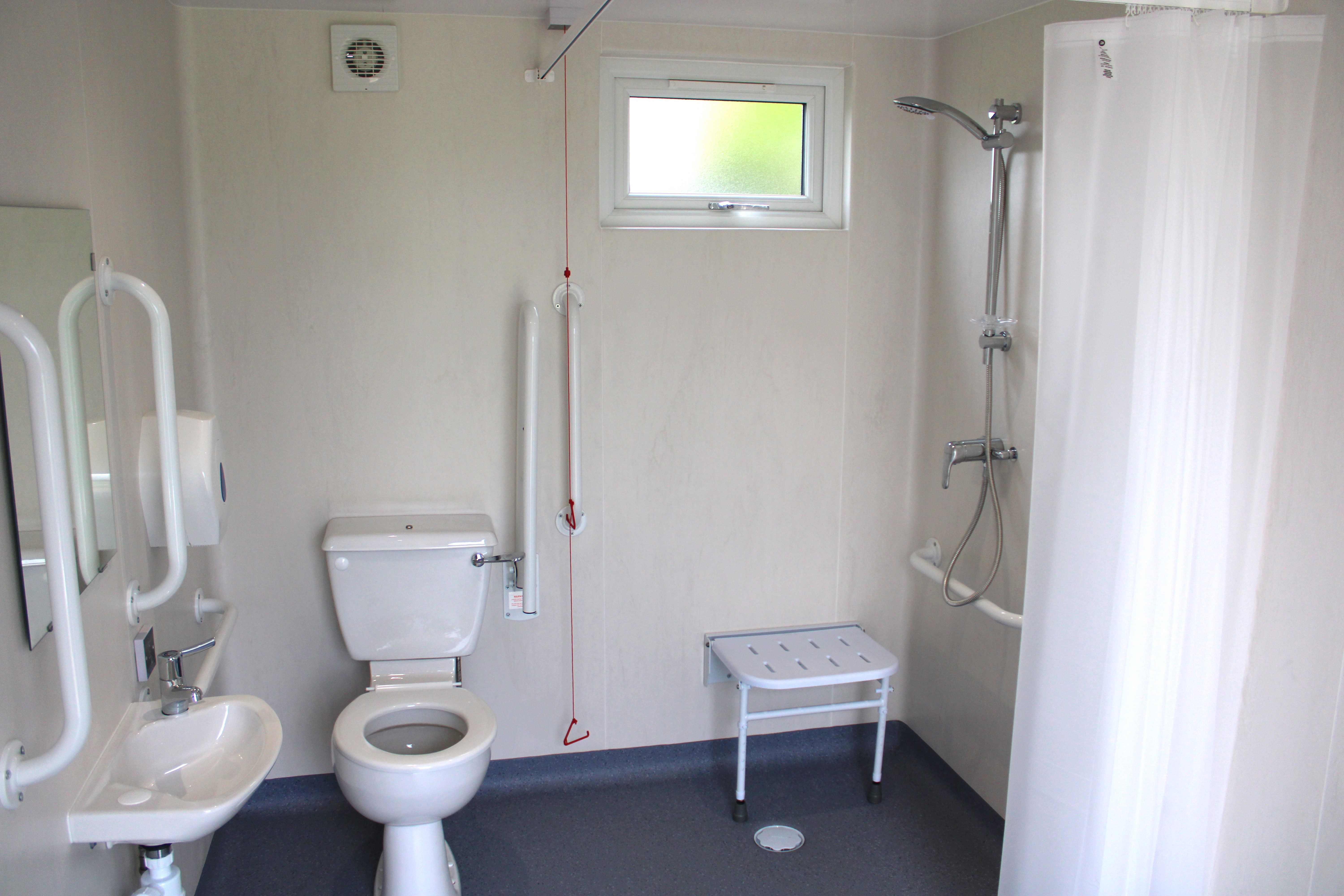 |
📸Top tip: Adding a site map to your photos can help people with a variety of access needs to understand the layout of your site, and anticipate what to expect for their stay.
The below image shows the site map of High Sand Creek, Norfolk.
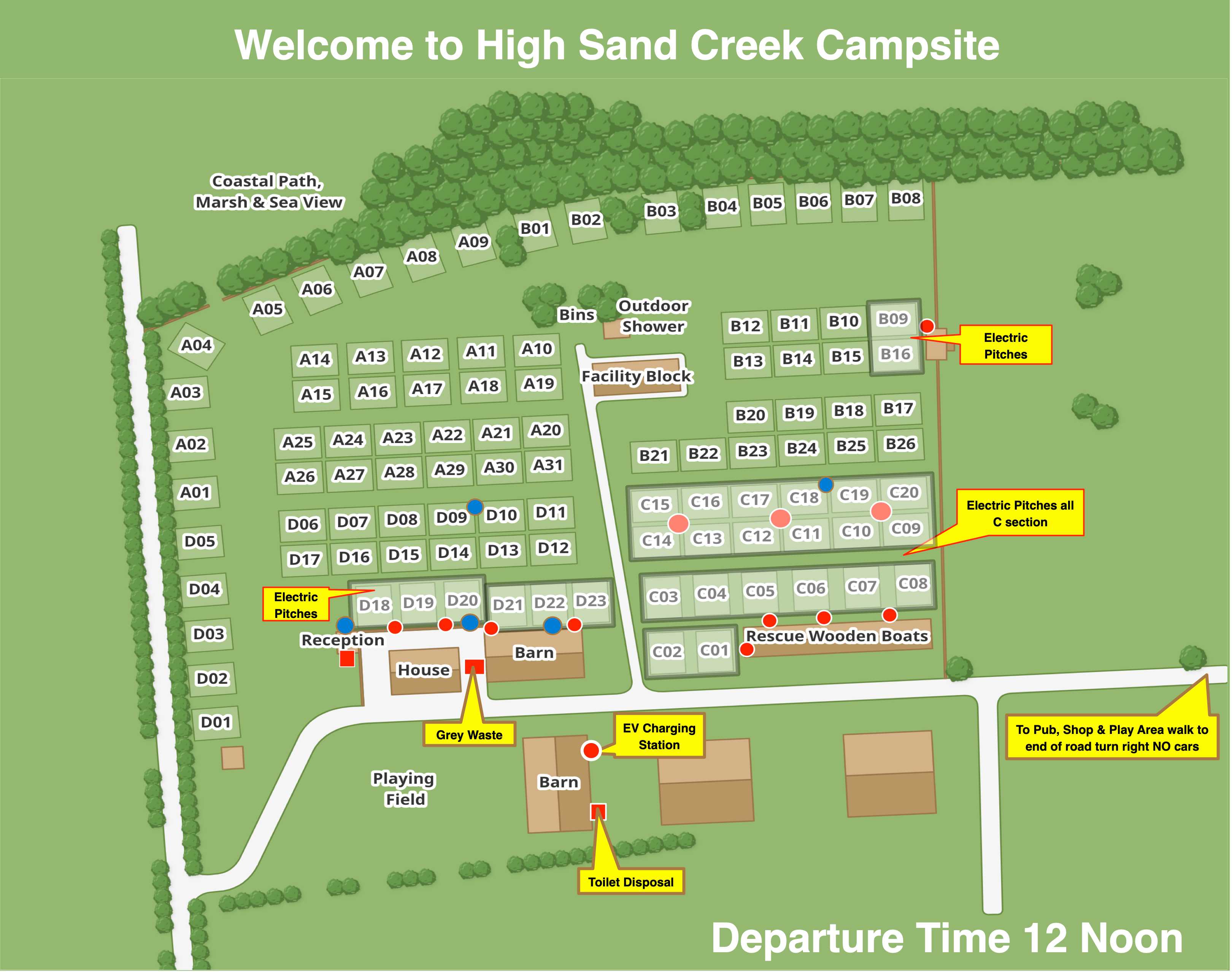 |
Additional examples
The below image shows the full access ramp to the bathroom and facilities block at The Star Inn, Essex.
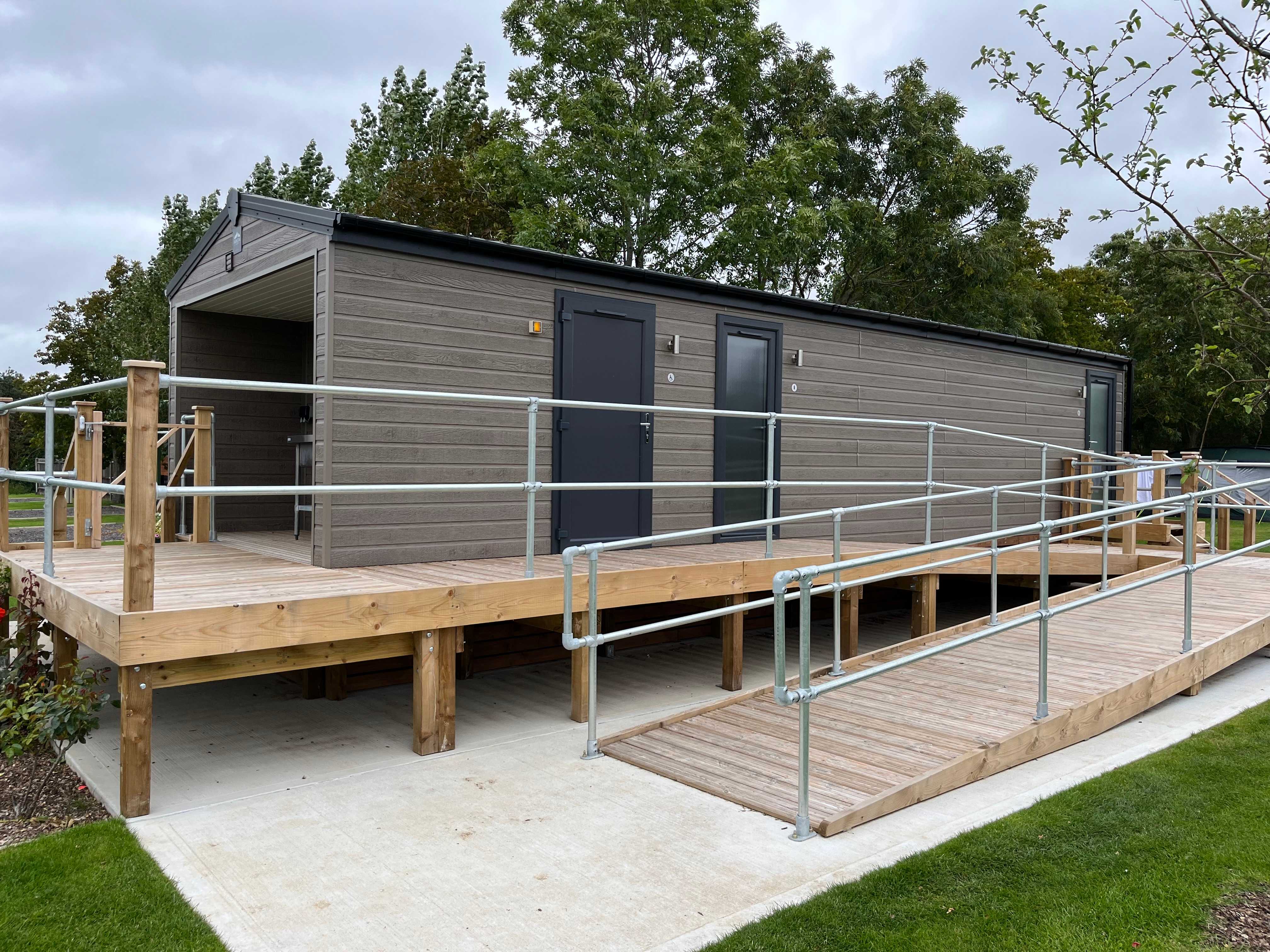 |
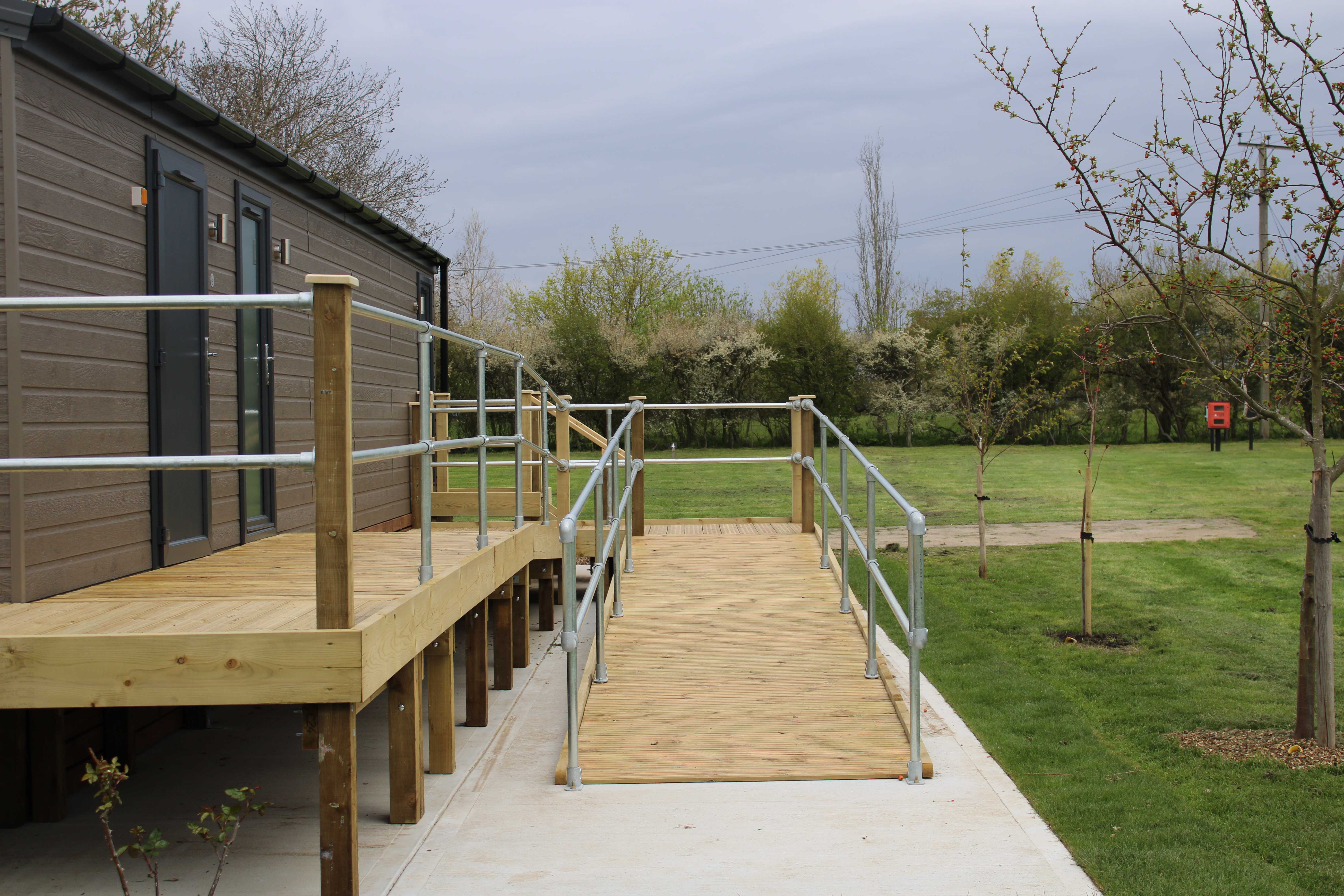 |
The below image shows the accessible parking space and level-access entrance to the on-site pub at The Star Inn, Essex.
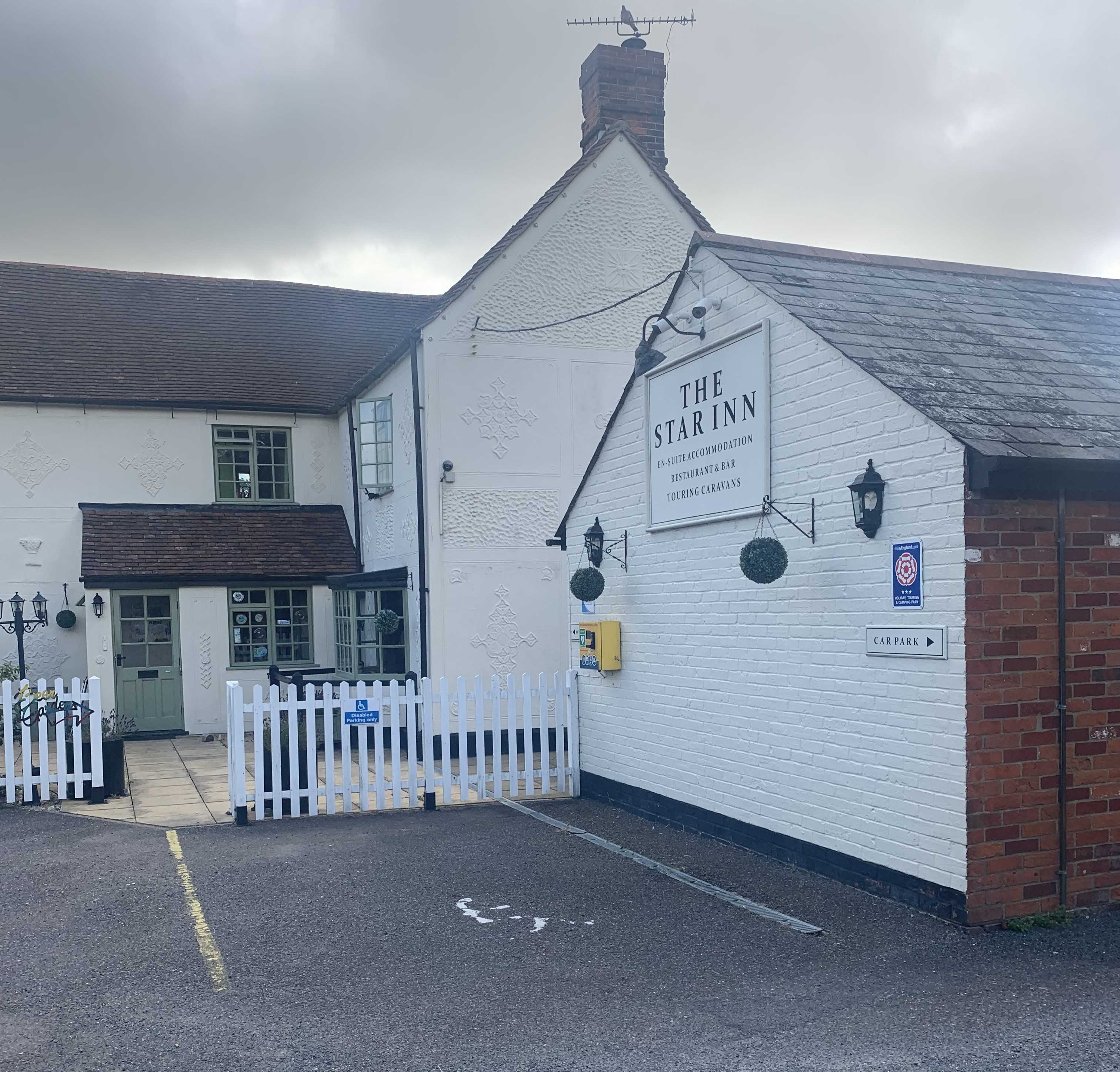 |
The below images from Pen Y Bont Touring and Camping Park in Wales show the safari tent from different interior and exterior angles, to give the customer a good sense of the entrance, the space and how they can move around.
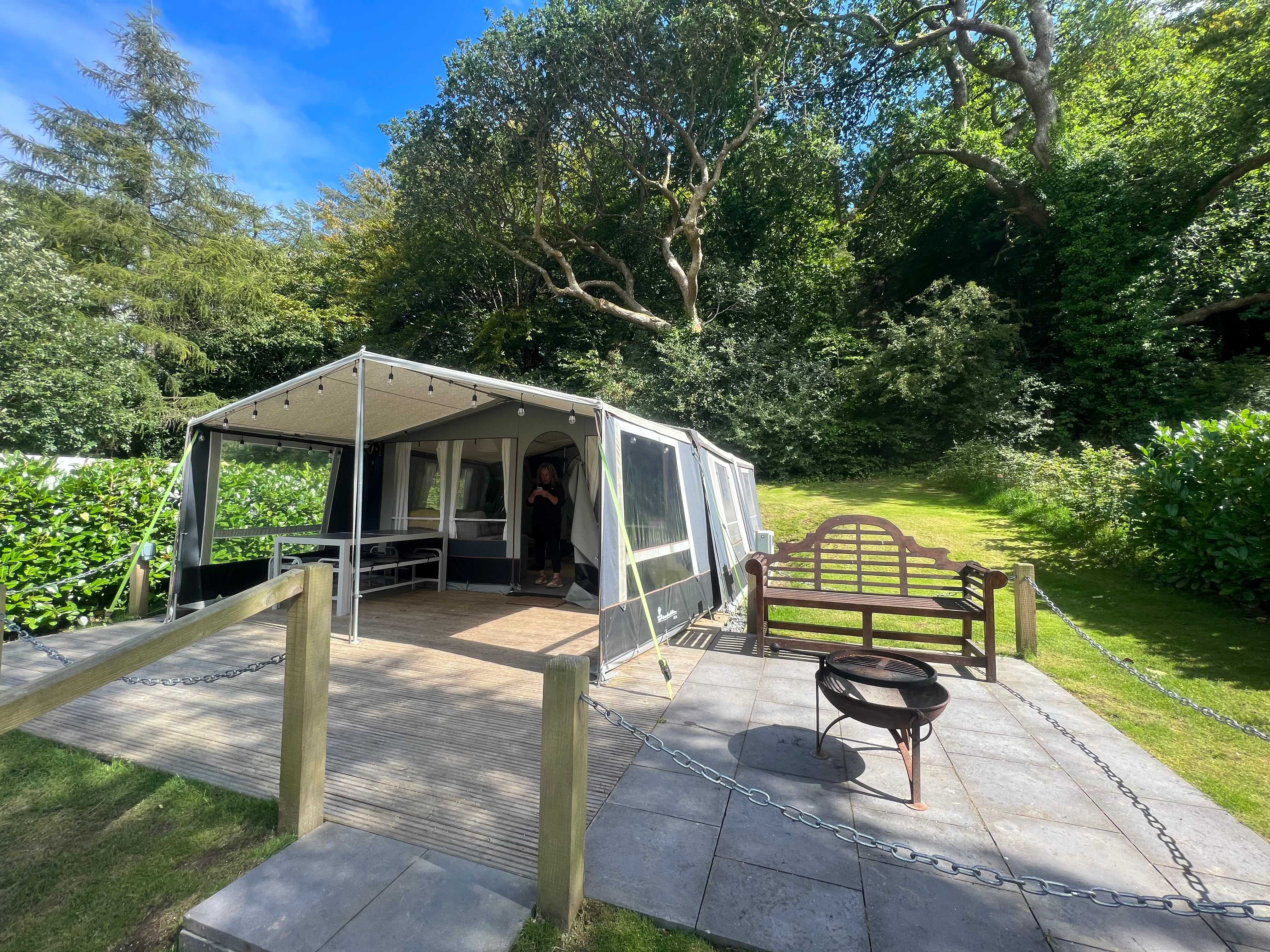 |
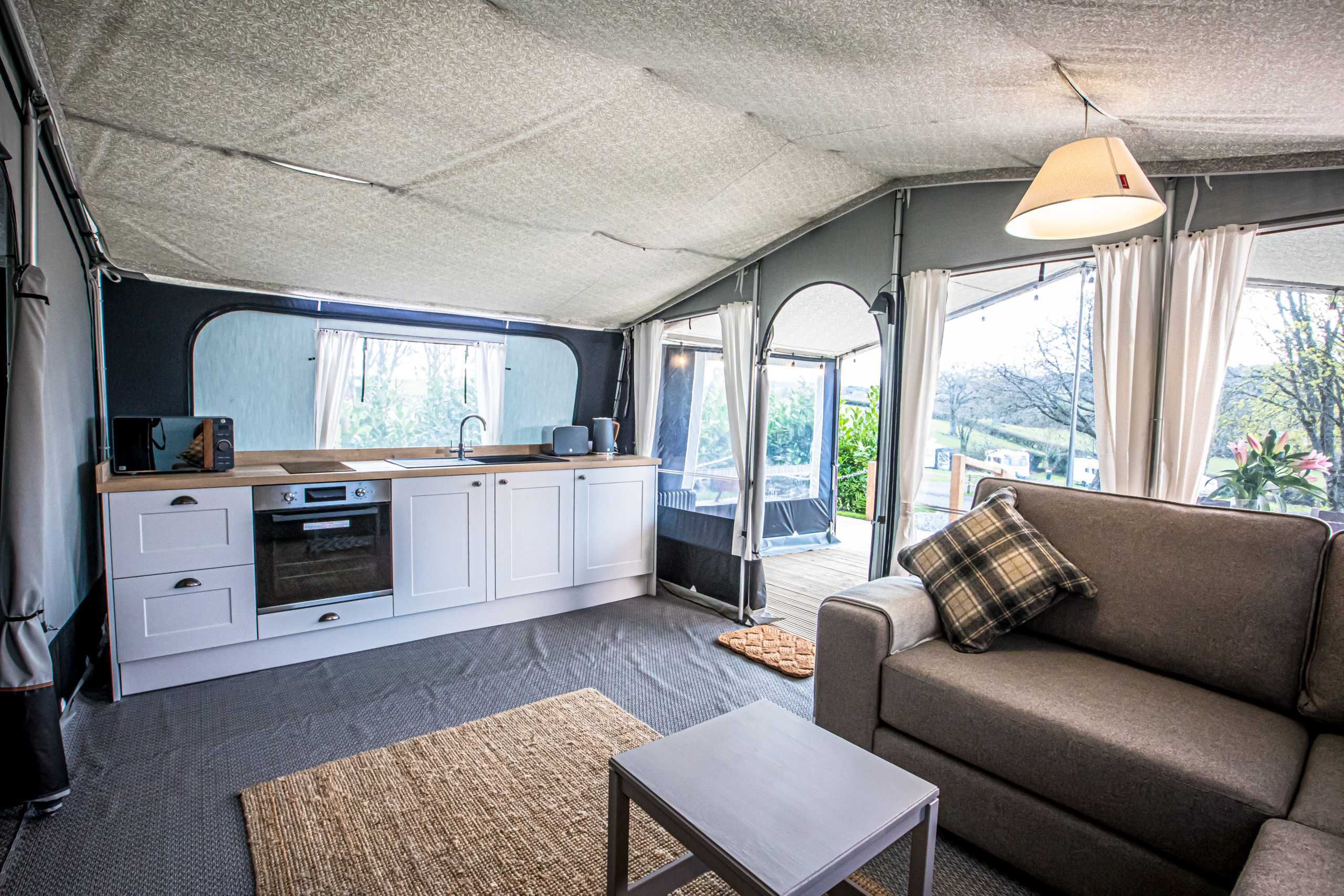 |
The below image shows the step-free entrance, with the doors open, to the reception building at Trevornick Holiday Park, Cornwall.
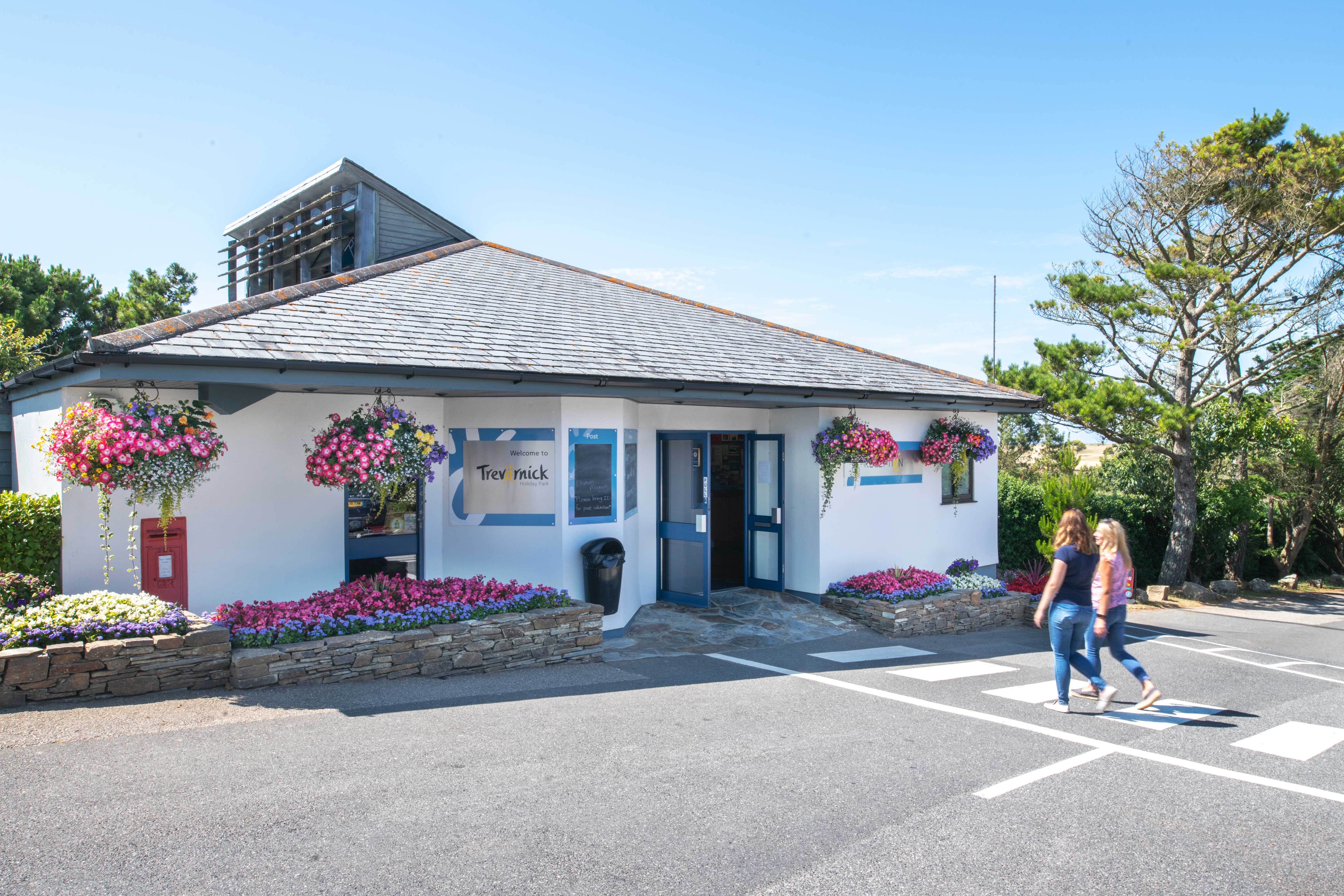 |
Nearby attractions
As well as adding as much information to your listing about your site’s accessibility, enhance the guest experience further by providing information about local attractions that have good accessibility.
This could be a local pub, hike, beach or visitor attraction such as a stately home or museum. It could even be the ‘quiet hours’ at your local supermarket, to support people with sensory sensitivities or prefer a calm environment.
Be sure to stock up on leaflets for local accessible attractions to share with guests too. Ask your local tourist information and attractions if they also have promotional leaflets available in braille or large print to offer to guests with visual impairments.
If you’re in the UK, check for a ‘Miles without Stiles’ group near your site. These are often run by your local National Park Authority and are a directory of footpaths that don’t have any stiles or cattle grids to cross, making them suitable for those with limited mobility or using assistive equipment.
Beyond Pitchup, where else can you market your accessibility features?
Many travellers with disabilities or access requirements book places to stay after receiving recommendations from a friend, family or trusted site. Maximise your exposure by spending a few minutes creating a listing on the sites below.
In the UK, there are numerous directories (with a global reach) where you can advertise your business.
-
Access Card - Create a listing for free. Each listing is verified before being added to the Access Card Directory and available to view by their 350,000+ strong community.
-
Tourism for All - A non-profit aiming to make it easier for people with disabilities and access requirements to find great places to stay that meet their needs. Some Pitchup users are already making use of Tourism for All’s Travel Planner:
-
AccessAble - A specialist consultancy that will have a member of their team visit your site to create an Access Guide, this details the accessible features of your site, and is published on your listing in their directory. Check out the existing Pitchup users with Access Guides:
-
Eden Leisure Village - find Eden Leisure on Pitchup.com
-
Red Deer Village Holiday Park - find Red Deer Village on Pitchup.com
-
Rubberslaw Wild Woods Camping - find Rubberslaw on Pitchup.com
-
Lee Valley Campsite Sewardstone - find Lee Valley on Pitchup.com
-
Euan’s Guide - Create a listing page for free! This quick and simple site allows you to promote your site, as well as allowing visitors to leave reviews for others.
-
Did you know 46% of respondents to Euan’s Guide Access Survey said they visited somewhere new after reading a review on Euan’s Guide, and 51% said reviews from other disabled people improve their confidence when visiting new places!
-
Check out this review for River Dart Country Park, available to book on Pitchup.com.
-
Top tip: You can also use this site to find accessible places nearby such as attractions, restaurants and coffee shops to recommend to your guests.
Useful resources
Check out the free resources below for practical hints and tips and to expand your knowledge.
We highly recommend the Visit England Toolkits which are hot off the press, having only been released in December 2023.
-
Visit England tools
-
Visit Britain Accessibility Webinar (2020). An introduction to Accessible Tourism with Ross Calladine, Accessibility and Inclusion Lead at Visit England, Chris Veitch, Accessible Tourism Consultant, and Martin Sibley, Author, Adventurer and co-founder of Purple Goat.
-
Awareness Training from Visit Birmingham
-
Communicating well: Language dos and don’ts
-
If you or your team are worried about saying the wrong thing, check the resources below for guidance on inclusive and respectful language to use when discussing accessibility and disability:
-
Level the Playing Field has several guides including definitions of disability, disability words and language, and interacting with the disability community
-
The UK Government lists simple top tips on words to use and avoid
-
The Business Disability Forum lists top tips on using inclusive language
-
British Dyslexia Association has a Dyslexia Friendly Style Guide
-
Disability-focused organisations
-
Tourism for All A non-profit organisation that provides online information to help disabled travellers make informed choices. Services for businesses include staff training, travel planner listings, top tips and Q&A for businesses
-
European Network for Accessible Tourism (ENAT) ENAT is a non-profit that brings together tourism organisations from across Europe to share experience, learn, collaborate and create tourism products that are accessible to all
-
Scope: Learn about the Social Model of Disability [video]
-
Learn more about Scope’s work and the Social Model of Disability here
-
Scope is a charity that exists to create a fair and equal world for disabled people
Your obligations as a tourism business and duty of care
-
The Equality Act 2010: An Introduction
-
What is disability discrimination? Equality Law: Discrimination Explained
-
Visit Britain: The Pink Book
-
Learn more about your duty of care as a tourism business owner. The book gives you clear guidance and practical information on the legislation that affects you.
-
Dementia Friendly Tourism Guide offering support and advice on how to make your business welcoming and inclusive to those living with dementia
The Pitchup.com sites leading the way in accessible holidays for disabled guests
Here at Pitchup.com we believe the outdoors is for everyone, and we’re committed to supporting as many people as possible to enjoy the benefits of an outdoor holiday.
We’re planning changes to our site, search filters, and working with the community of campsites, glampsites, and holiday parks using Pitchup.com to help make their sites more accessible for the disability community and those with access requirements.
But, we’re most proud of the site managers and owners who are leading the way in ensuring their accommodations are safe, comfortable and accessible for everyone, and they’re giving us some serious wanderlust at the same time too!
Hear from the sites in their own words below…
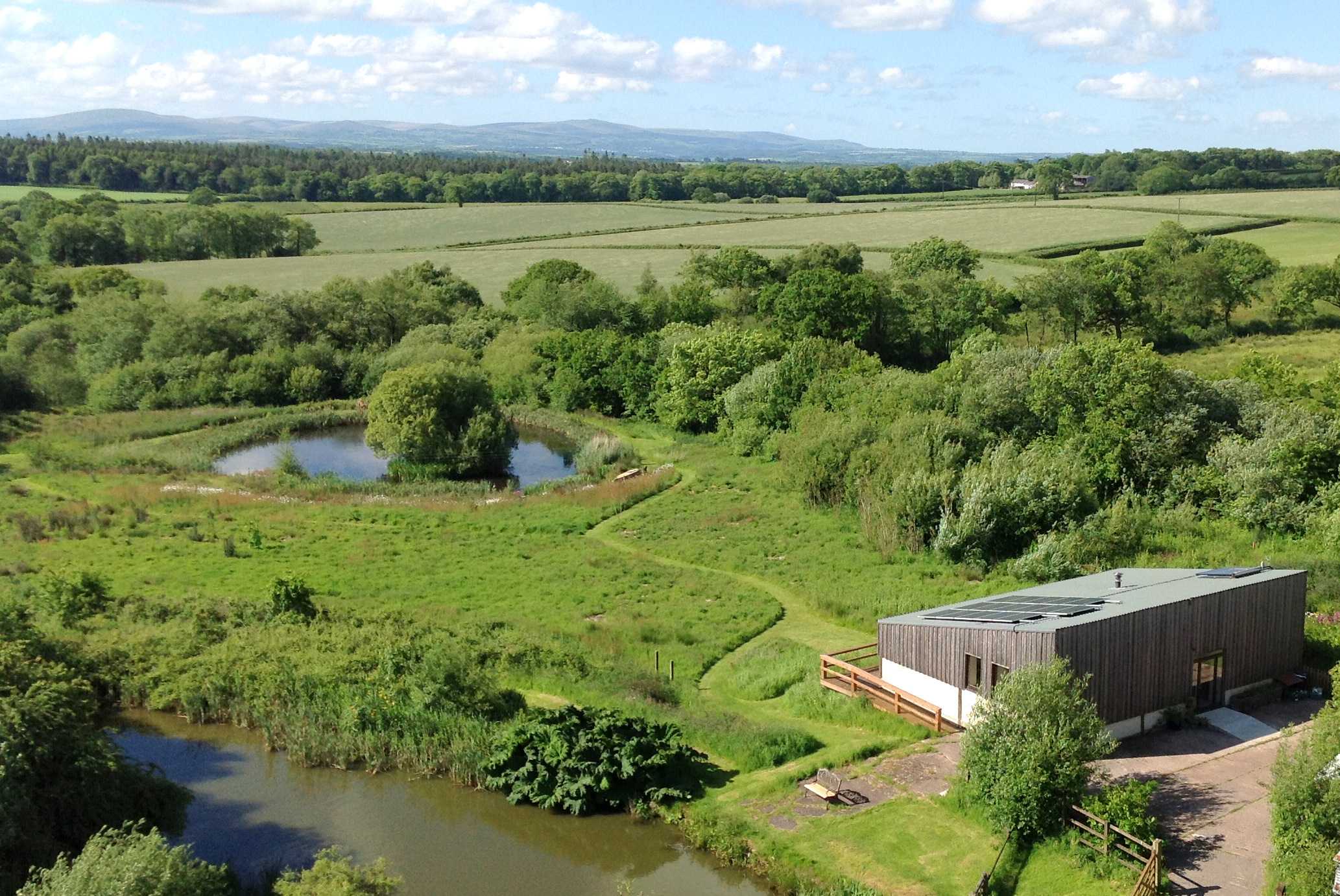
Wheatland Farm, Devon
Wheatland Farm is an award-winning ecosite owned and managed by Ian Ripper & Maggie Watson. The beautiful Balebarn Lodge is wheelchair accessible, including a wet-room with roll-in shower and shower chair.
What motivated you to start your eco-site?
We had a desire to manage some land for wildlife and biodiversity. Maggie is an ecologist and I [Ian] have been in tourism most of my life, so we thought land with some accommodation would fit the bill.
After 17 years, our 21 acre site is a joy with fabulous diversity and a tranquil haven to explore. The 5 accommodation units are private and secluded, and being well away from the road and town we enjoy quiet - apart from birdsong - and beautiful dark nights with stars.
Why is accessibility and inclusivity important to you?
In our first few years we occasionally had disabled guests with minor mobility issues, but realised our then 4 properties were not very accessible. When we decided to build our straw-bale eco-lodge (Balebarn Lodge) we put a lot of effort into making sure it was as usable as possible to everyone. We have friends with disabilities and know from them how difficult it can be to find suitable accommodation.
What was your approach to improving the accessibility of your site? Do you engage with any individuals, specialists or community groups for advice?
A friend of mine, who is a wheelchair user, was really helpful in giving me design guidance and we built Balebarn Lodge to be as accessible as possible with our limited budget.
Wheelchair users enjoy the single level floor in the lodge with wide doors, but also the extras like our shower wheelchair to use in the wet room
We continue to learn and try our best to improve things around the site - like bridging a muddy gap in the path around our wildlife pond so that a wheelchair can use it. But it is hard on a site like ours. We have collected various bits of equipment to loan out as needed too. Things ranging from toilet seat raisers, walking frames, and shower stools, to baby carriers and baby baths so that guests can enjoy the place.
What has your customer response been?
The response has been fantastic. So many guests came the first time because of a lack of alternative accessible accommodation, but come back because it's a lovely place and because we try our best to accommodate their needs.
What top-tip would you give to others who are looking to improve the accessibility of their sites?
I think one of the main lessons we have learnt is that accessibility is a lot more than making something wheelchair friendly.
We had a guest with tunnel vision who enjoyed a guided nature walk because of the extra help we could give (a homemade walking stick and a helping hand).
I think it's the willingness to accommodate needs that makes a big difference. Put yourself in someone else's shoes and think how it feels if you can't bend low enough to plug your gadget into a low level socket… Easy to fix!
Everyone deserves a good holiday.
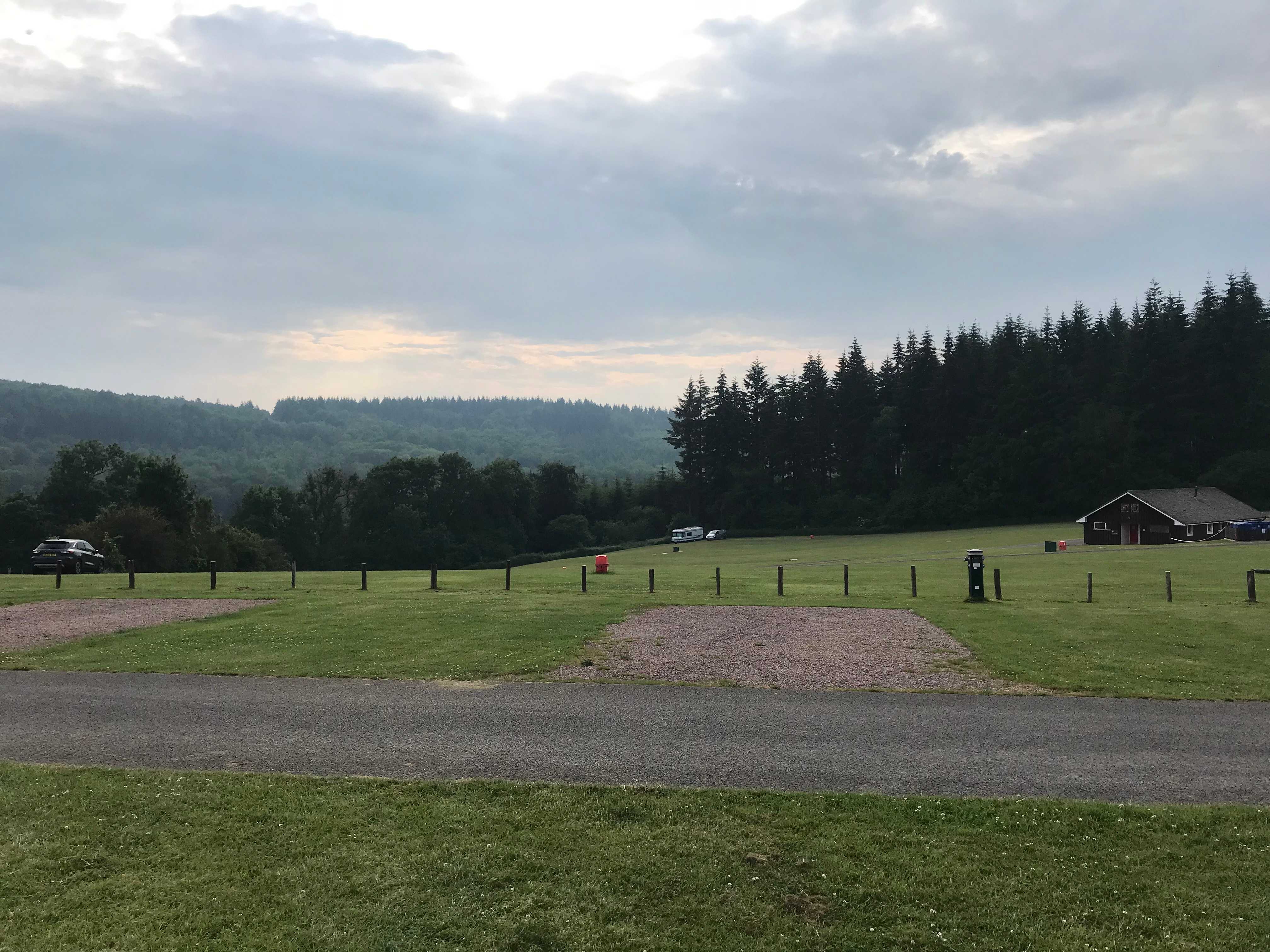
Bracelands Campsite, Gloucestershire
Bracelands Campsite is on the edge of the Forest of Dean, in the Wye Valley Area Of Outstanding Natural Beauty. Bracelands Campsite is part of the Sherwood Pines Group, who work in partnership with Forestry England to offer exceptional access to nature while protecting the local environment.
Amanda Bass is the group’s Central Operations Executive, and kindly shared her thoughts on their approach to accessibility and inclusion.
What motivated you to become a campsite manager?
The executive team at Sherwood Pines have a passion for the great outdoors and collectively we have over 60 years of experience working within the industry! When the opportunity arose to partner with Forestry England and run 3 campsites of our own on their behalf, it gave us the chance to stand out and commit to investing in expanding their camping offer and bring a new sense of life back to the sites.
Why is accessibility and inclusivity important to Bracelands?
We believe camping and glamping should be for all, with no exclusivity, no membership required and no boundaries. Bracelands Campsite is situated in a most picturesque forest with plenty to do everywhere you turn, and of course getting back to nature is proven to improve our feelings of wellbeing and ease mental health challenges.
What is your approach to improving the accessibility of your site?
Bracelands has been operating as a campsite for over 50 years. A key to its longevity is making the site accessible by following guidelines and legislation, listening to our customers, and taking on board their needs. The basics are simple, access ramps, handrails, adapted changing facilities, installing family rooms with baby changing, but it goes beyond adaptations too.
We have introduced Equality, Diversity & Inclusion Awareness training for all our team members and revised our access statement.
What has your customer response been?
The reviews we receive speak volumes. Neither are we surprised that we have many families return regularly to get their loved ones away into natural environments which can benefit people particularly with autism and ADHD. We started a rock painting gallery for a family who visits us with their son who has autism. Each time they visit he picks a rock from the forest to paint and the team adds it to ‘his’ gallery - it’s something we hope he can be proud of and helps him feel like he belongs.
We also run an annual poster design competition for children with learning difficulties to design posters for the campsites, last year it was Sherwood Young Artists. This year we have invited an artistry school for disabled young adults to enter the competition, the winning design gets printed and displayed on site, and they win a weekend away for them and their family and carers.
What top-tip would you give to others who are looking to improve the accessibility of their sites?
Live a day in the shoes of the customer, see this from their point of view instead of “operationally”. Be prepared to go one step above and exceed expectations. Be prepared to invest, implementing change is neither cheap nor easy… but in this day and age it’s what we should be doing to make everyone welcome.
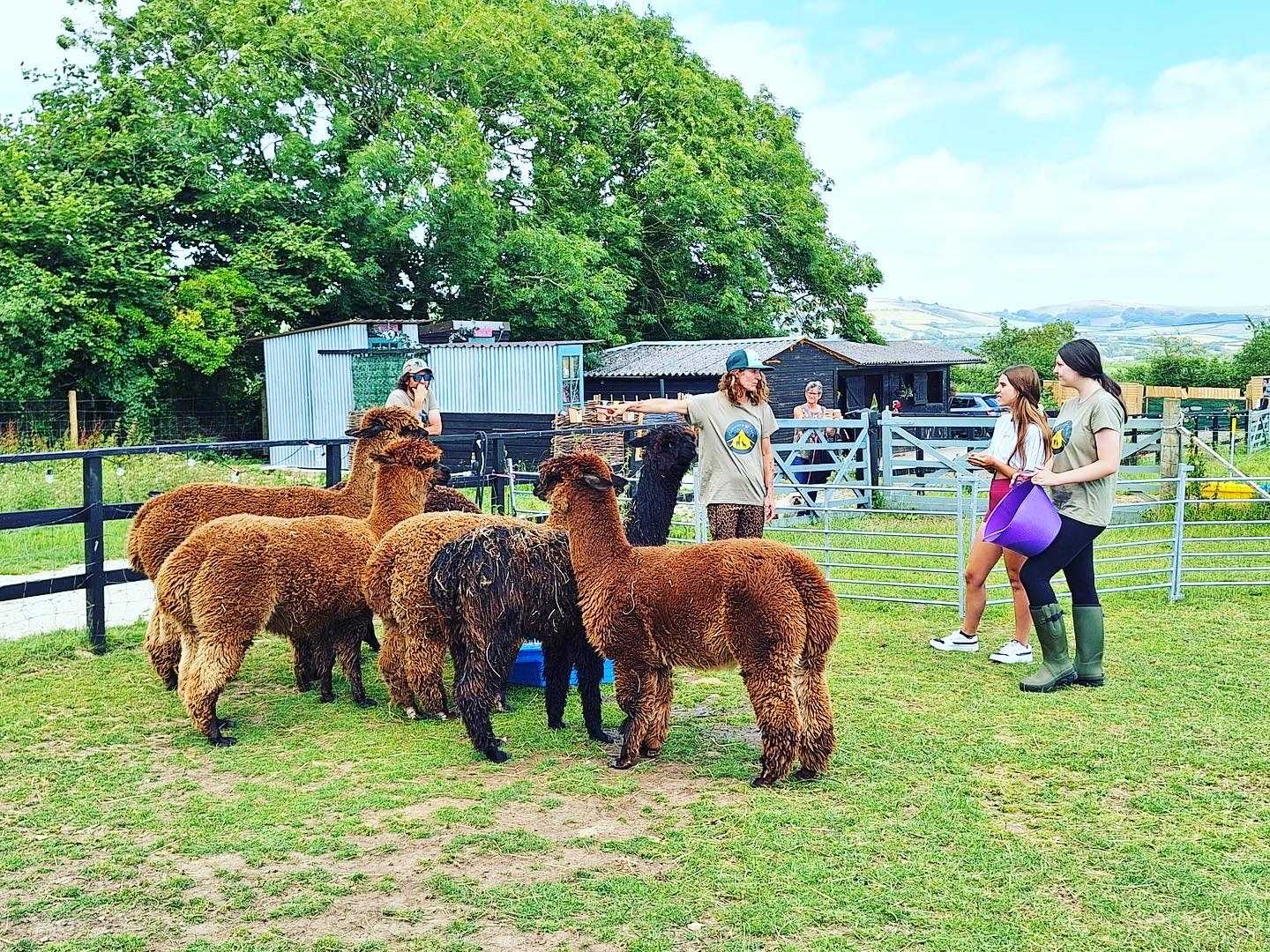
Flowerdew Farm, Dorset
Flowerdew Farm is an eco-friendly working alpaca and goat smallholding tucked among hills in the Dorset Area of Outstanding Natural Beauty. We caught up with owner, Claire, to hear more about her fascinating career and approach to accessibility and sustainability.
What motivated you to start your campsite?
Flowerdew Farm is more than just an eco-camping and glamping site, we are also a small holding that trains volunteers and provides experiences for guests that share our passion on farm diversification, animal welfare, ethical breeding and utilising alpaca fleece and manure for products, as well as providing creative, nature and wellness workshops.
As the owner of the site, I wanted to carry on my family's work with animals and inclusivity, mental health and well-being, especially catering for the needs of the more vulnerable groups. We support special educational needs and disability, female empowerment, LGBTQI and sustainability.
My grandfather was blind, and growing up I saw the discrimination he faced. My Mum retrained in braille and became a leading expert at the Royal London Society for the Blind, where I later joined her volunteering as an animal and art therapy assistant. I have also worked as an environmental documentary filmmaker and producer, working with many nonprofits.
After experiencing burnout, receiving a late diagnosis for ADHD and perimenopause, and losing my Grandad to covid, it was time to bring all my loves together. I set up Flowerdew Farm as a dedication to my family and to build a fun, safe and happy place that anyone can access.
Everyone should have the right to nature and access to animals.
Why is accessibility and inclusivity important to you?
I have experienced discrimination at all stages of my life, whether it has been through my Grandad’s blindness, being neurodivergent myself, or gender inequality and being part of the LGBTQI community. I understand the impact this can have and want to give the support and extra care that is needed to those guests.
Partnering with the Dorset START Mental Health team is one of our driving forces at Flowerdew Farm. Animal wellness experiences and spending time in nature is scientifically proven to reduce the stress on our nervous system and build healthy coping tools for our everyday challenges.
I want my guests to be able to take a holiday, disconnect and rest in a non-judgemental environment, with like minded staff, volunteers and fellow guests.
We are a predominantly women-led team, and love hosting solo female travellers, and groups of female travellers. We love empowering others.
What was your approach to improving the accessibility of your site?
Improving accessibility at Flowerdew Farm is still work in progress, and we are by no means there yet. We are improving wheelchair access, introducing large print guides, and making hearing and sight improvements.
What we started with was a good moral compass, and we test everything through the lens and eyes of a visitor.
Safeguarding for our guests and animals is super important, so we sought advice and guidance from the Volunteer Centre in Dorchester, the Jurassic Coast Trust, Eco reports, a private risk assessor, the Bridport Tree Planting Group and NHS Dorset Mental Health Team. We also hold a licence with Dorset Council Animal Welfare.
We also work with like minded local collaborators such as Jo Sadler Willow, who caters for all abilities in her workshops, and teaches the power of crafting and creativity for our mental health. Jo also teaches traditional land crafts that encourage biodiversity. These workshops are available to all our guests.
We are also proud partners with Wanderlust Camping Club, who support access to nature for all, and give a portion of their fees to wildlife and nature conservation projects.
What has your customer response been? Do you have any stand-out moments you'd like to share?
Gosh so many. Honestly it is a dream and a privilege to be able to share this journey, and it is a journey. We are still growing, and running a new business is tough! I don't really get any free time at the moment and all my energy goes into Flowerdew Farm. If I am not running my business I share my time for free helping, training the volunteers, which I LOVE doing and is key to the farm and building our community.
This has been one of the biggest compliments from our guests, they love our volunteers and animals, and that we are approaching this with kindness, fun, education and play.
What top-tip would you give to others who are looking to improve the accessibility of their sites?
-
Start as you mean to go on, be authentic and don’t worry if you can't do it all in one go! We haven’t and we see this as a work in progress. We also accept that not everyone likes a label, and some people don’t like to mention their accessibility requirements until they arrive, or maybe not at all. That’s ok with us.
-
If you don’t know where to start, I highly recommend you seek out the support from local businesses, community and like minded groups and advisors for safeguarding. Throughout, stick to your passions and goals.
-
And finally please, give back where you can. Our nature, animals, humans and planet will benefit, and so will your site and business.
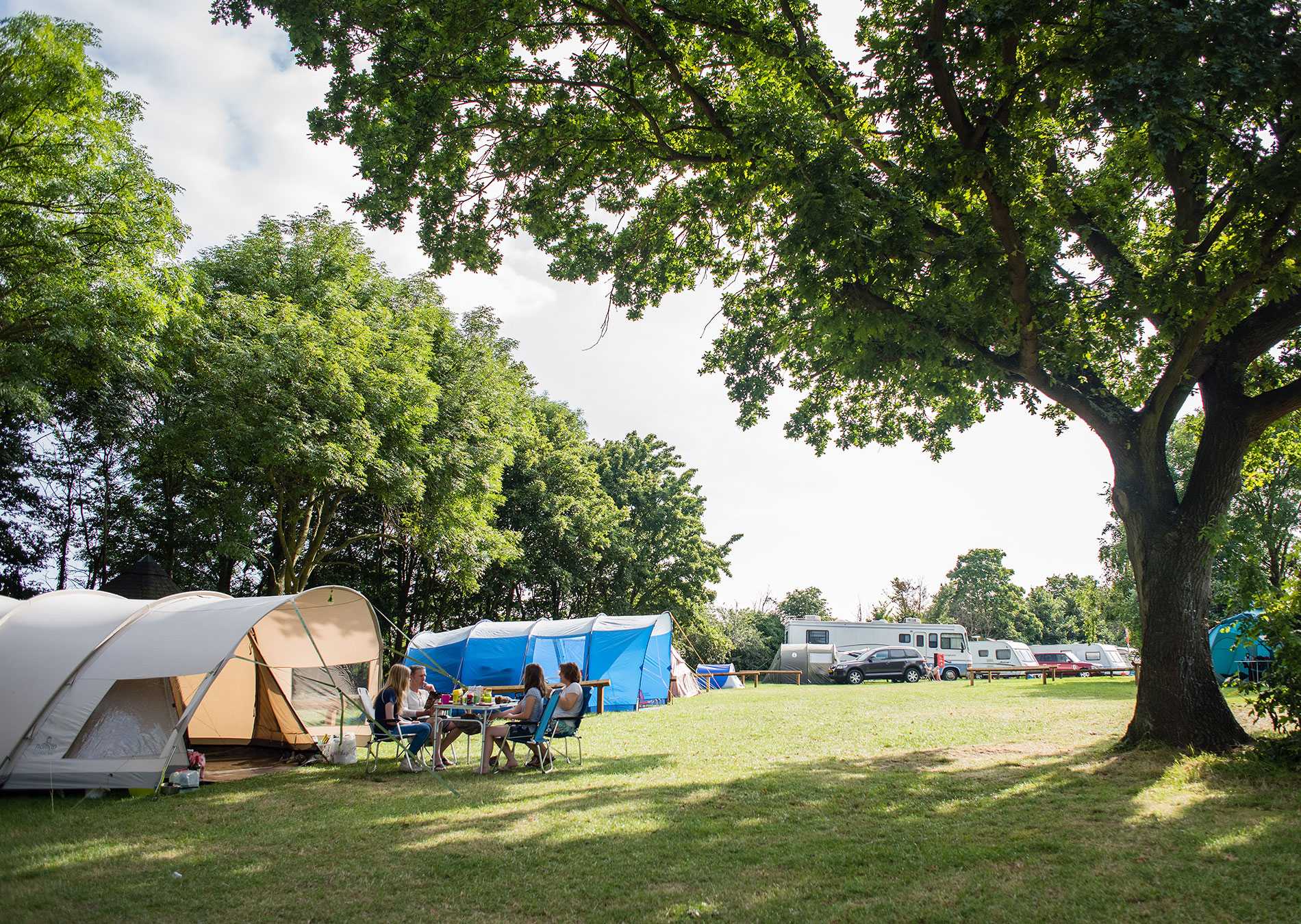
Lee Valley Camping and Caravan Park, Greater London
Lee Valley Camping and Caravan Park, located in a peaceful spot in Greater London, is a unique site managed by Lea Valley Regional Authority. James Hetherington, Accommodation and Golf Manager, shares how they’re making accessibility a part of their day-to-day operations.
What motivated you to become a campsite manager?
I have previously been involved in all forms of leisure from professional football teams through to running hotels, country clubs and even night clubs. I manage four campsites and one golf course and I have a unique opportunity to progress and develop each as we feel appropriate.
Why is accessibility and inclusivity important to you?
The Lee Valley Regional Authority was set up to protect open spaces and to provide access for all, from a nature reserve to Olympic legacy sites, so inclusion is a core principle in all our workings. Campsites by their very nature can be challenging for people with accessibility requirements but it is these challenges that drive us forward to provide better facilities.
What is your approach to improving the accessibility of your site? Did you engage with any individuals, specialists or community groups for advice?
We have a wide variety of support groups and companies that assist us with our daily operations or when planning new projects. It is with new projects that we can really make a difference as we are able to work with contractors and even manufacturers to incorporate better, more inclusive designs. When refurbishing and improving accommodation, we look to introduce amenities that make a stay a better experience, this can include improved and adjustable lighting, vibrating pillows and sloped access to support those with sensory, hearing or mobility needs.
When we started to review our accommodation, it was clear that we could improve both the stay and the amenities and wherever we fell short, it was mirrored across all sites. In order to improve this and to provide uniformity, we appointed an Accessibility Lead from our existing staff to review all our sites and suggest meaningful improvements. We are now working towards these improvements, both retrofitting and including the changes in new build projects where we work closely with the manufacturer.
What has your customer response been? Do you have any stand-out moments you'd like to share, or has anything surprised you?
It's early in the process but we are looking to amend our post-stay survey questionnaire to gain more customer feedback on accessibility. Where we have seen positive feedback is changing our landing pages, we now ask whether guests have accessibility needs and encourage guests to call us prior to their visit to discuss. This way we’re able to prepare, give guests a great experience, and make plans to assist them properly in the event of an incident.
What top-tip would you give to others who are looking to improve the accessibility of their sites?
Review everything with a fresh set of eyes, and have a can do approach.
Need help or want to discuss an idea? Get in touch at enquiries@pitchup.com

